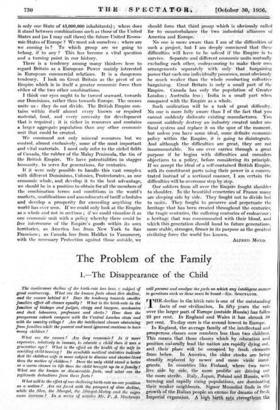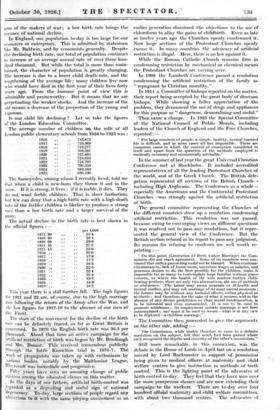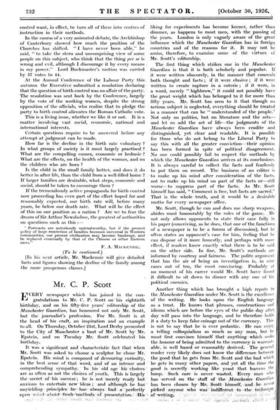The Problem of the Family
1.—The Disappearance of the Child The continuous decline of the birth-rate has been a subject of great controversy. What are the known facts about this decline, and the causes behind it ? Does the tendency towards smaller families affect all classes equally ? What is the birth-rate in the families of bishops and judges, clergy and- lawyers, "mechanics and dock labourers, professors and clerks ? How does the prosperous suburb Compare with the -Central- London slush rand with the country village ? Are the intellectual classes abstaining from families while the poorest-and most ignorant continue to have many children ?
What are the. causes ? Arc they econcimie? Is it more expensive, relatively to income, to educate a child than it was a geniratien ago ? What is the effect on the health of the wife in avoiding chill-bearing? Do available medical statistics indicate that the childless wife is more subject to disease and shorter-lived than the mother of children ? Does the only child stand a better or a worse chance in life than the child brought up in a family? What are the known or discoverable fac4s, and what are the legitimate deductions from these facts ?
What will be the effect of our declining birth-rate on our position as a nation ? Are we laced with the prospect of slow decline, while the Slav, the Mongol, the Mongol-Malay and. the negro races increase ? In a series of articles Mr. P. A. Mackenzie will present and analyse the fads on which any intelligent answer to questions such as these must be based—En. SPECTATOR.
r HE decline in the .birth rate is one of the outstanding JL facts of . our civilization. In fifty years .the rate over the larger part of Europe (outside Russia) has fallen: 25 per cent. In England and Wales it has shrunk 50 per cent. To-day. ours is the second lowest in Europe.
In England, the average family of the intellectual and prosperous classes now numbers less than two children, This means that those classes which by education and position naturally lead the nation are rapidly dying out, and : their place will be occupied. by fresh eleMents from below. In America, the older stocks are being steadily replaced by newer and more virile immi: grants. In countries like Finland, where two races, live side by side, the more prolific arc driving out, the more sterile. Italy, Japan, Poland and Russia, with. teeming and rapidly rising populations, are dominating their weaker neighbours. Signor Mussolini finds in the growth of the Italian people an excuse for dreams of fresh Imperial expansion, A high !;■irt11.. rgte .§trenehsa the: arm of-the makers of war ; a low birth rate brings the menace' of national decline. • • - In England, our population to-day is too large for our resources or enterprises. This is admitted by statesmen like Mr. Baldwin; and by economists geneially.- Despite the declining birth rate; our total of population continues to increase at an average annual rate • of over three hun- dred thousand. But-While the total is more-than main- tained, the charaCter of population is greatly changing. The increase is due to a lower child death-rate, and the lengthening of the average life; many children live now who would have died in the first year of their lives forty years ago. FrOm the hnmane point of view this is admirable and praiseworthy. But it means that we are perpetuating the weaker Stocks. And the increase of the old means-a decrease of the proportion of the young and vigorous.
Is our child life declining ? Let us take the figures of the London Education Committee.
The average number of children on the rolls of all London public elementary schools from 1916 to 1925 was :
1916 .. .. 743,871 1917 .. - 733,968 1918 .. 719,277 1919 . 709,381 1920 727,495 1921 .. 724,834 1922 .. 718,793 1923 .. 700,559
,1924 .. 689,589
1925 .. .. 680,190
The SanuVedes, among whom I recently lived, told me that when a child is new-born they throw it out in the snow. If it is strong,' it lives ; it is feeble, it dies. They do not want feeble children. That is sheer barbarism, but few can deny that a high birth rate with a high death rate of the feebler children is likelier to produce a strong race than a low birth rate and a larger survival of the puny. .
The actual. decline in the birth rate is best shown in the official _figures
per 1,000 1871-80. .. 35.4 1881-90 32.4
••-1 -•1891-00 29.9
1901-10 271 1911-15 23.6 1916 ., 21.0 1917 • • • 17.8.
.1918 .. 17..7 1919 .. 18.5 1920 .. 25.5 1921 .. 224 1922 .. 20.4 1923 .. 19-7.
1924 .. .. 18.8
1925 18.3
This year there is a still further fall. The high figures for 1921 and 22 are, of course, due to the high marriage rate folloWing the return of the ArinSr after the War, and the low figures for 1917-18 to the absence of our men at the Front.
The start of the moi-ement for the decline of the birth rate can be definitely traced, so far as Great Britain is concerned. In 1876 the English birth rate was 86.8 per thousand About that time an active campaign for the 1irtificial restriction of birth was begun by.Mr. Bradlaugh And Mrs. hesant. This received tremendous' publicity throuh the futile KrioirifUn • trial' in 11176-7. The work of propaganda was taken up with enthusiasm by ,rarious bodies, notably and the Malthusiaii 'League. The result was immediateand progressive.
'Fifty years have 'eeit* an amazing change ' of public opinion among the educated classes on this matter. In the days of our fathe, artificial birth-control was _regarded as a degrading and sinful -sign of -national ,degeneracy. _To-day, large sections 'of people regard any objections- te) it with the same pitying amusement as an earlier. generation dismissed the objections to the use. of chloroform to allay the pains of childbirth. Even as late as twelve years- ago the Churches openly condemned it. Now large sections of the Protestant Churches openly excuse it. In many countries the advocacy of artificial restriction is illegal. Here, there is no law against it.
While the Roman Catholic Church remains firm in condemning restriction by mechanical or -chemical means the Protestant Churches are veering. over.
In 1908 the Lambeth Conference passed a resolution condemning the artificial restriction of the family as " repugnant to Christian morality."
In 1914 a Committee of bishops reported on the matter, their report being accepted by the great body of diocesan bishops. While showing a fuller appreciation of the problem, they denounced the use of drugs and appliances for this purpose as " dangerous, demoralizing and sinful."
Then came a change. In 1925 the Special Committee of the National Council of Public Morals, including leaders of the Church of England and-the Free Churches; reported :- " For large numbers of people, a simple, healthy, normal married life is difficult, and in some cases. all but impossible. There are numerous cases in which the control of conception, considered in itself and apart from the question of the methods emplOied is medically necessary and economically advisable."
In the summer of last year the great Universal Christian Conference met at Stockholm. It included accredited representatives of all the leading Protestant Churches of the world, and of the Greek Church. The •British dele- gation represented all sections of the British Church—. including High Anglicans. The Conference as a whole— especially the Americans and the Continental Protestant Churches—was strongly against the artificial restriction of birth.
The general committee representing the Churches of the different countries drew up a resolution condemning artificial restriction. This resolution was not passed, because owing to converging-views on different questions it was resolved not to pass any resolutions, but it repre- sented the general-view of the Conference. But the British section refused in its report to pass any judgment. Its reasons for refusing to condemn are well worth re- printing :- " On this point (Limitation of Birth within Marriage) the Com- mission-did not reach agreement. Some of its members were con. vinced that such a proceeding could not be blamed. When economic circumstances, lack of house-room, uncertain wages or salaries, and generous desires to do the best possible for the children, make it impossible for so many to contemplate large families without grave concern, or where the health of the wife renders further child- bearing perilous, there are.only two alternatives, the use of methods or abstinence. The latter may mean neurosis or ill-health and mental conflict, and may rob marriage of it most-sacred momenta ; the former may be without any harmful effects, either physical or aesthetic ; and therefore, for the sake of what it secures, and in the absence of any divine prohibition or clear moral condemnation, is to be tolerated and even commended. It is not to be used to promote selfishness ; its employment outside marriage is not here i contemplated ; nor must it be used to secure—what is in any c It30 to be deplored—a childless marriage."
Tile Committee then proceeded to give the arguments on the other side, adding :— " The Commission, while unable therefore to come'to a definite resolution on the subject, felt that much had been gained where each recognized the depths and sincerity of the other's convictions."
Still more remarkable, in this connexion, -was the debate in the House of Lords in April last on a resolution moved by Lord Buckmaster in support of permission being given to medical officers at maternity and child•-• welfare 'centres to give instruction in methods Of- birth control. This 'is the fighting point of the advocates of birth control to-day. They feel that they have won over the more prosperous classes and are now extending their campaign- to- the WorkerS. There are to-day over four hundred 'official maternity and child welfare committees, with abOnt two thousand centres. The advocates of control want, in effect, to turn all of these into centres of instruction in their methods.
In the course of a very animated debate, the Archbishop of Canterbury showed how much the position of the Churches has shifted. " I have never been able," he said, " to take the stern and uncomprising view of some people on this subject, who :think that the thing per se is wrong-and evil, although I discourage it by every means in my power." • Lord Buckmaster's motion was carried by 57 votes -to 44. • At the Annual Conference of the Labour Party this autumn the Executive submitted a resolution declaring • that the question of birth control was no affair of the party. The resolution was sent back by the Conference, largely by the vote of the working women, despite the strong opposition of the officials, who realize that to pledge the party to birth control alienates the Roman Catholic vote.
This is a living issue, whether we like it or not. It is a matter involving vast social, economic, national and international interests.
Certain questions require to be answered before- any attempt-at judgment- can be made. - How far is the decline in the birth rate voluntary ? In what groups of society is it most largely practised ? . What are the compelling causes, economic or hedonic ? What are. the effects, on the health of the woman, and on the children who are -born ? - Is the child in the small family better, and does, it do .. better in after life, than the child from a well-filled home ?. If larger families are desirable, what steps, economic and social, should be taken to encourage them ?
If the tremendously active propaganda for birth control now proceeding has even part of the effect hoped for and reasonably expected, our birth rate will, before many years, be below our death rate. What will be the effect of this on our position as a nation ? Are we to. fear the. dream of Sir Arthur Newsholme, the greatest of authorities on questions such as this :—
" Forecasts are notoriously untrustworthy, but if the present. policy of large restriction of families becomes universal in Western communities,' our present civilization may become bankrupt, and be replaced eventually by that of the Chinese or other Eastern
races." F. A. MACKENZIE.
(To be continued.) [In his next article, Mr. Mackenzie will give detailed facts and figures showing the decline of the family among the more prosperous classeS.] . .




























































 Previous page
Previous page